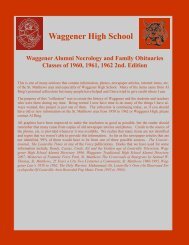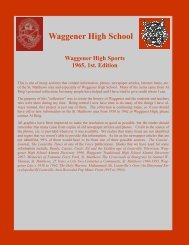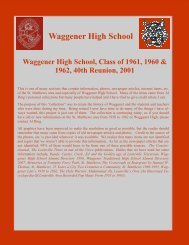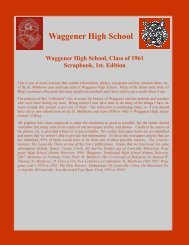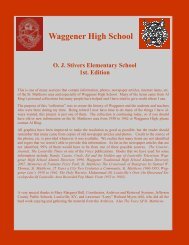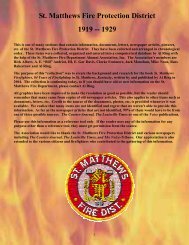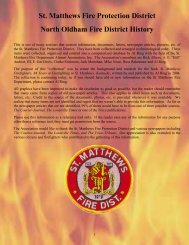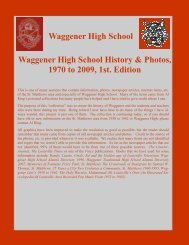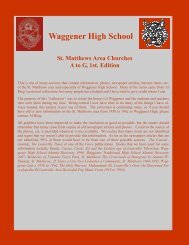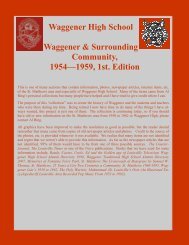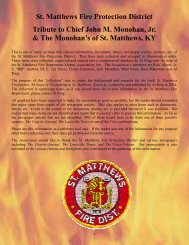Our Era - Movies, Music, Radio and TV, 6th Edition
Our Era - Movies, Music, Radio and TV, 6th Edition
Our Era - Movies, Music, Radio and TV, 6th Edition
Create successful ePaper yourself
Turn your PDF publications into a flip-book with our unique Google optimized e-Paper software.
<strong>Our</strong> <strong>Era</strong> - <strong>Movies</strong>, <strong>Music</strong>, <strong>Radio</strong> & <strong>TV</strong>, 1950‟s <strong>and</strong> 1960‟s. 1964The OxfordsCourtesy http://garagehangover.com/?q=taxonomy/term/1615Meanwhile back in the 60's, there was an all-girl b<strong>and</strong> in Louisville known as The Hearby.Jim Guest <strong>and</strong> I liked their sound <strong>and</strong> helped them make their first <strong>and</strong> only record. I wasparticularly interested in their lead singer Jill DeMarco.In 1968 our group evolved again. This time, drummer Jim Guest was replaced by DonnieHale, Dill Asher became the bass player, <strong>and</strong> most significantly, I asked Jill to join the group.This was the group that recorded the bulk of the LP material. Donnie's friend Keith Springwas a brilliant musician <strong>and</strong> orchestrator. Keith agreed to do the orchestrations for the albumcuts <strong>and</strong> played on the recording sessions. Keith, also played in the group for a short time in1968. However, the musical direction we were going with Keith was far too esoteric for thegigs we were playing (we actually played regularly at Fort Knox during the Viet Nam War).Keith later went on to work with actor/musician Martin Mull <strong>and</strong> legendary rock groupNRBQ. That year we got to open for Frank Zappa <strong>and</strong> the Mothers at a Louisville rock club<strong>and</strong> for The Grateful Dead at Bellarmine College.In 1969, Dill Asher was replaced by bassist Larry Holt, <strong>and</strong> Donnie Hale was replaced bydrummer Paul Hoerni (brother of the Rugby's bass player Mike Hoerni). We recorded severalmore album cuts <strong>and</strong> the group's last single "Come On Back To Beer", which was inspired byour contact with Frank Zappa. This single was released on Paula Records <strong>and</strong> made it to numberone on rock radio in Louisville.In 1970 the album was finally finished. Although we had offers from two record labels, wewere uncomfortable with both deals. The labels wanted total control, along with buy-outs ofall materials <strong>and</strong> rights. We decided to release <strong>and</strong> promote the record ourselves.In 1971, out of the frustration of not being able to play enough original songs on our gigs, I got heavily involved with a theatricalproduction that I had written. My show was a rock musical called "Grease". It happed simultaneously with anothermore-famous production by the same name that was just starting in Chicago. The Oxfords got all greased up <strong>and</strong> became thepit b<strong>and</strong> for the show. It ran for several weeks on the University of Louisville campus <strong>and</strong> was also performed in Atlanta <strong>and</strong>at the University of Kansas.At that same time, I had gotten a notice from Selective Service to report for a draft physical. I fasted for two weeks <strong>and</strong>weighed only 117 pounds (10 pounds underweight for my 5'-11" height) at the time of the physical. Because of this, however,I didn't have enough strength to support the weight of my guitar <strong>and</strong> also sing. I decided I'd switch to playing flute <strong>and</strong>we added keyboardest Jerry Lister to the group. We recorded "The City" with this group, but it was never released on vinyl.Finally in 1972, Paul, Larry, <strong>and</strong> Jerry all left the b<strong>and</strong>. Quentin Sharpenstein, became the bass player. Quentin had playedtuba on the orchestra overdub session for our album four years earlier. Guitarist Tony Williamson, a good friend of Larry,<strong>and</strong> jazz drummer Bobbie Jones also joined the group. Jill played both guitar <strong>and</strong> clavinet at various times, <strong>and</strong> I played aHammond organ <strong>and</strong> Rhodes piano.That same year, Danny King, a friend of mine, opened a recording studio. I volunteered the b<strong>and</strong>'s services in trade for studio time, <strong>and</strong> soon became the studio's engineer. I wasn't paid, but I used this opportunity to record most of the later cuts onthe CD.By this time, it was becoming obvious (even to me) that the Oxfords were not on the road to rock stardom. Jill was especiallytired of the situation, the other musicians had opportunities to play with other groups, <strong>and</strong> I had discovered that my passionwas working in a recording studio.The group disb<strong>and</strong>ed for good in the summer of '72. But hey, that's the cool thing about recording...the music lives on!Jay Petach



